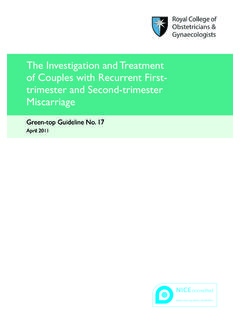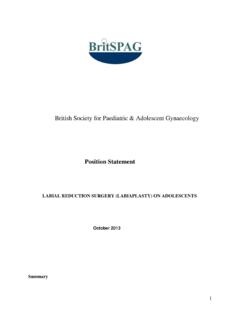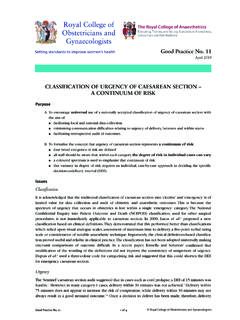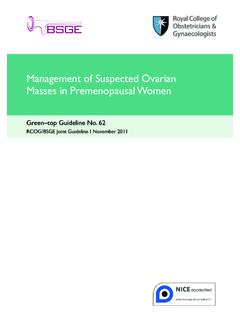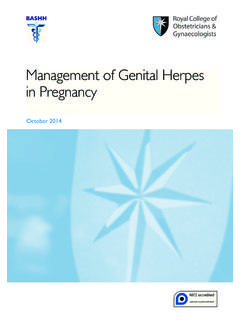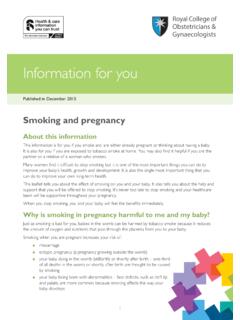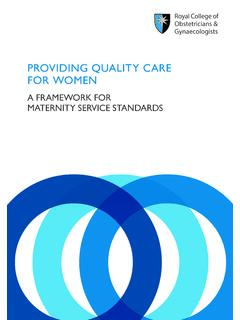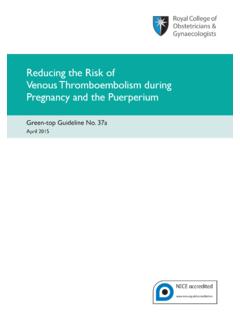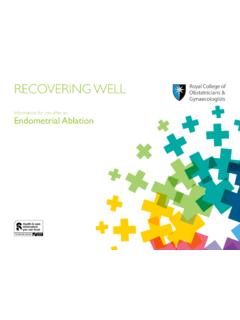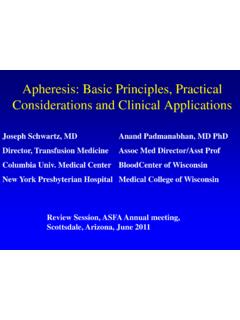Transcription of The Management of Women with Red Cell Antibodies during ...
1 The Management of Women with RedCell Antibodies during PregnancyGreen-top Guideline No. 65 May 2014 RCOG Green-top Guideline No. 652 of 26 Royal College of Obstetricians and GynaecologistsThe Management of Women with Red Cell Antibodiesduring PregnancyThis is the first edition of this summary of recommendationsPrepregnancy counsellingWomen with red cell Antibodies , particularly if there is a risk of fetal anaemia or if compatible donor redcells for transfusion may be difficult to obtain, should attend for prepregnancy counselling with aclinician with knowledge and expertise of this condition.
2 Red cell Antibodies in pregnancyWhat red cell Antibodies are clinically significant (maternal and fetal) during pregnancy? All Women should have their blood group and antibody status determined at booking and at 28 weeksof gestation (Appendix 2). What are the implications for the fetus and neonate from red cell Antibodies ?Clinicians should be aware that severe fetal anaemia can result in hydrops which significantly worsensthe perinatal outcome. When and how should paternal and fetal genotyping be performed?Non-invasive fetal genotyping using maternal blood is now possible for D, C, c, E, e and K antigens.
3 Thisshould be performed in the first instance for the relevant antigen when maternal red cell Antibodies are present. For other antigens, invasive testing (chorionic villus sampling [CVS] or amniocentesis) may be consideredif fetal anaemia is a concern or if invasive testing is performed for another reason ( karyotyping). Is karyotyping contraindicated in the presence of maternal red cell Antibodies ? Invasive testing is not contraindicated if alloimmunisation has occurred. Anti-D prophylaxis should be given to cover invasive testing if the mother is rhesus D (RhD) negativeand is not sensitised.
4 If the fetus is at risk of anaemia, when should referral to a fetal medicine specialist take place?Referral to a fetal medicine specialist should occur when there are rising antibody levels/titres, alevel/titre above a specific threshold (see section ) or ultrasound features suggestive of fetal anaemia. Referral should take place if there is a history of unexplained severe neonatal jaundice, neonatalanaemia requiring transfusion or exchange transfusion , in order to exclude haemolytic disease of thefetus and newborn (HDFN) as the cause.
5 PDDCPPDPP Royal College of Obstetricians and Gynaecologists3 of 26 RCOG Green-top Guideline No. 65 For Antibodies other than anti-D, anti-c and anti-K, the following should prompt referral to a fetal medicinespecialist: a history of previous significant HDFN or intrauterine transfusion (IUT), or a titre of 32 or above,especially if the titre is rising as rising titres correlate with increasing risk and severity of anaemia. What thresholds should be used for the various Antibodies that could cause fetal anaemia to trigger referralfor further investigation or monitoring?
6 An anti-D level of >4 iu/ml but <15 iu/ml correlates with a moderate risk of HDFN and an anti-D levelof >15 iu/ml can cause severe HDFN. Referral for a fetal medicine opinion should therefore be madeonce anti-D levels are >4 iu/ml. An anti-c level of > iu/ml but <20 iu/ml correlates with a moderate risk of HDFN, whereas an anti-c level of >20 iu/ml correlates with a high risk of HDFN. Referral for a fetal medicine opinion shouldtherefore be made once anti-c levels are > iu/ml. For anti-K Antibodies , referral should take place once detected, as severe fetal anaemia can occur evenwith low titres.
7 The presence of anti-E potentiates the severity of fetal anaemia due to anti-c Antibodies so that referralat lower levels/titres is indicated (unless the fetus has only one of these antigens). Once detected how often should antibody levels be monitored during pregnancy? Anti-D and anti-c levels should be measured every 4 weeks up to 28 weeks of gestation and then every2 weeks until anti-K titres do not correlate well with either the development or severity of fetal anaemia,titres should nevertheless be measured every 4 weeks up to 28 weeks of gestation, then every 2 weeksuntil delivery.
8 For all other Antibodies , retesting at 28 weeks is advised with the exception of Women who have aprevious history of pregnancies affected with HDFN when early referral to a fetal medicine specialist isalso recommended. For Antibodies that could potentially cause problems with cross-matching or issues with the availabilityof appropriate blood , discussion with the blood transfusion service is required regarding the frequencyof antenatal testing. This may depend on the type of antibody as well as the likelihood of requiringblood at short notice.
9 How should pregnancies at risk of fetal anaemia be monitored? The cause of the alloimmunisation, relevant past history and pregnancy outcomes should beascertained in order to generate an assessment of risk of HDFN. If the fetus carries the corresponding antigen for a maternal antibody which is capable of causing fetalanaemia and if the antibody levels/titres rise beyond the levels detailed in section then thepregnancy should be monitored weekly by ultrasound, specifically assessing the fetal middle cerebralartery peak systolic velocities (MCA PSV).
10 DPPCDCDPPPBR eferral to a fetal medicine specialist for consideration of invasive treatment should take place if the MCA PSV rises above the multiples of the median (MoM) threshold or if there are other signs offetal anaemia. Fetal monitoring is required (as above) once anti-K is detected. If fetal transfusion is required what type of donor blood should be used? Red cell preparations for IUT should be group O (low titre haemolysin) or ABO identical with the fetus(if known) and negative for the antigen(s) corresponding to maternal red cell Antibodies .
